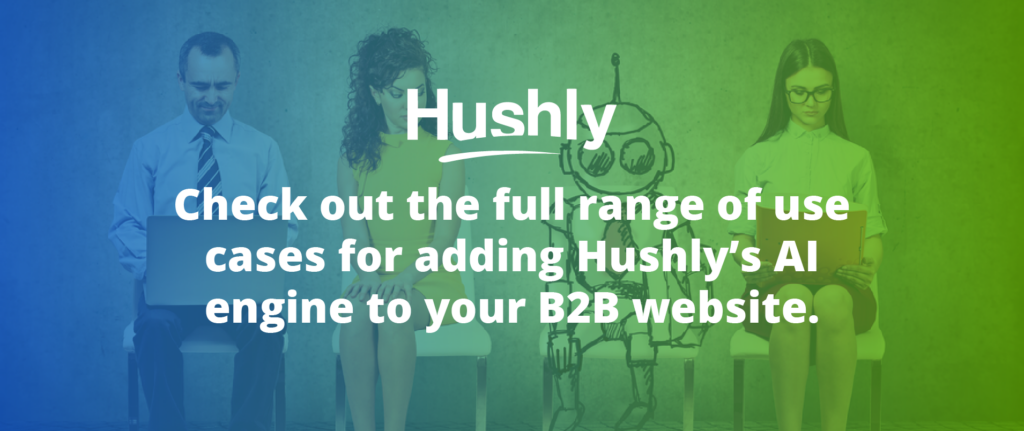Every time you open your phone, you use some type of AI and machine learning.
AI is so pervasive today you may not even realize it’s the driving force behind your favorite apps.
Well, your B2B buyers use AI every day too and they expect your website to employ some kind of machine learning features.
The question then becomes, what can AI do for B2B marketing? Furthermore, what are the advantages of artificial intelligence for B2B?
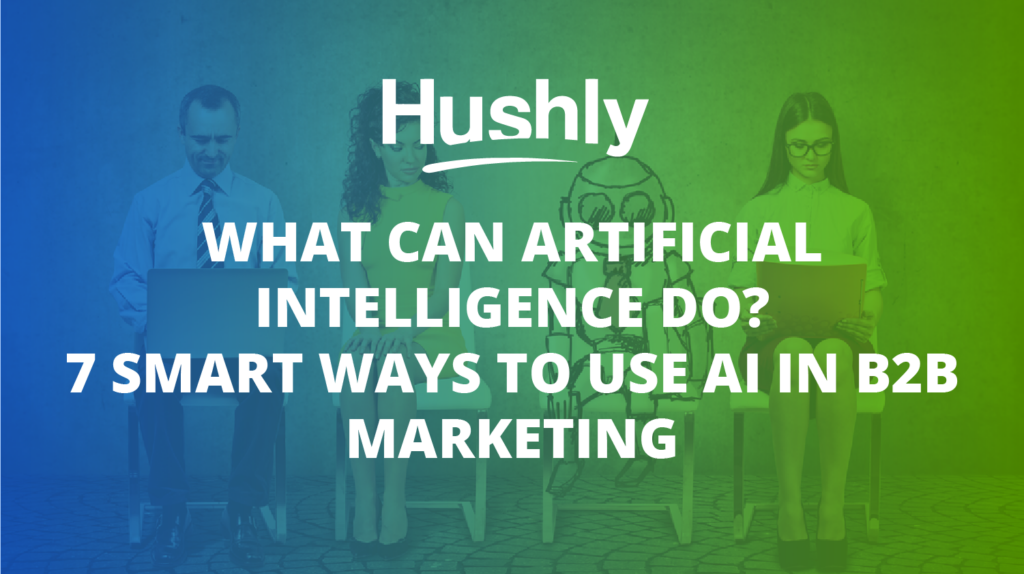
What Can Artificial Intelligence Do in B2B Marketing? 7 Advantages and Tools
As of last year, less than a third of companies used AI regularly. Today, over 84% of marketers use artificial intelligence, with AI software expected to become a $25 billion market by 2025.
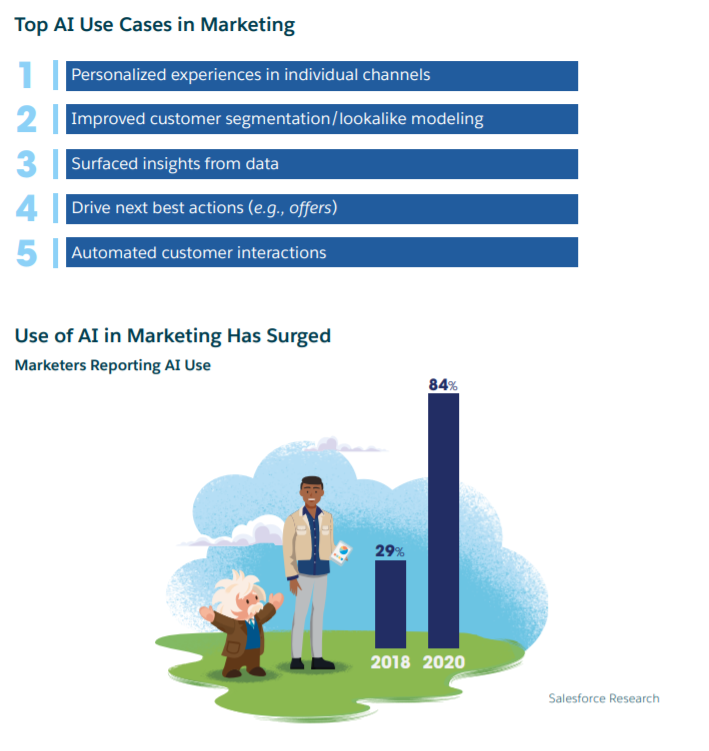
1. Chatbots for Answering Questions
The latest Gartner research shows that B2Bs spend 27% of their time researching online independently. Only 17% of their time is spent contacting sales teams – ALL sales times.
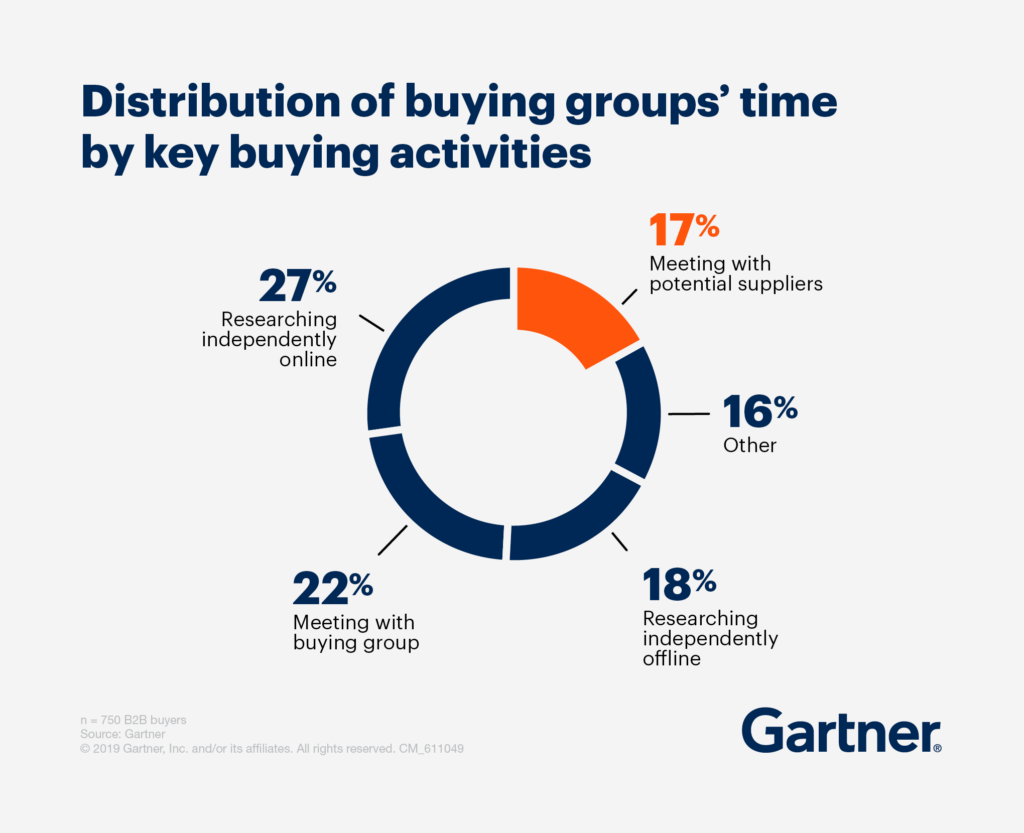
Adding an AI-driven chatbot to your website can fill the gap. In many cases, a lead may want to ask some basic questions without fearing the aftermath of sending an email or making a phone call. No one wants to feel hounded by sales teams.
Instead, a chatbot lets leads ask FAQs and have conversations. Chatbots are often more effective than live chats because they provide instant responses. Plus, machine learning allows chatbots to improve their answers over time.

Beyond adding a chatbot to your website, consider optimizing your Facebook, WhatsApp, and LinkedIn messengers as well.
2. Adaptive Content Hubs to Distribute Personalized Content
Marketers across the board say engaging visitors in real-time is a top priority:

People don’t have short attention spans. They do, however, have less time to dig through blogs and websites looking for relevant content.
That’s why 68% of buyers say they want you to organize your content by pain point while 58% would like to see it organized by industry or vertical.
Adding an AI- and machine learning-driven adaptive content hub to your website lets you organize your content based on industry, content type, pain point, importance, and more. Plus, it’s highly interactive. That’s important because 58% of buyers say they have no problem spending up to 20 minutes consuming interactive content.
Here’s a snapshot of what an adaptive content hub looks like in action:
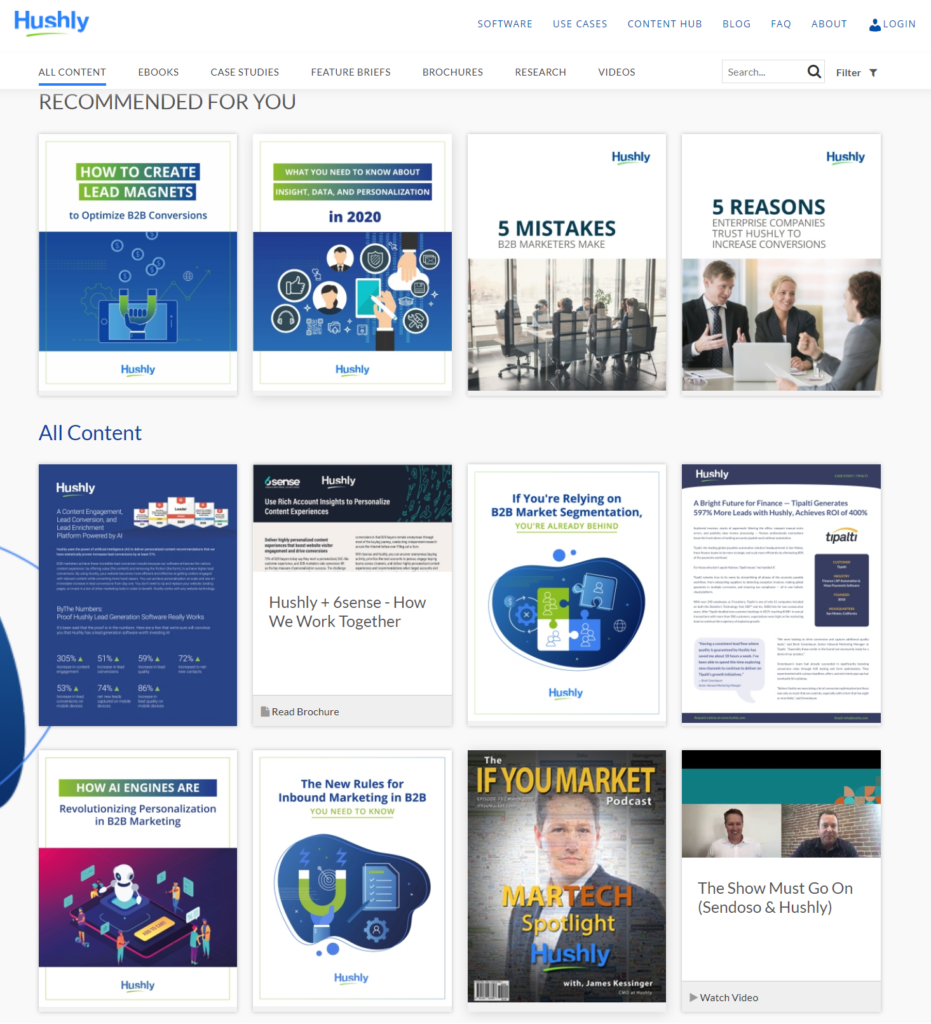
3. Automated Email Marketing Solutions
It’s important to mention here that automation is different from machine learning. Machine learning studies behavior and improves itself. Automation is simply automatic.
However, that doesn’t mean automation isn’t useful! In fact, when it comes to email, automation is incredibly powerful.
You can design stunning email campaigns for different segments or firmographics. When a new lead signs up for your list, place them into a unique category based on certain qualities – such as their job role or company.
From there, each subscriber will receive an onboarding series about your company, industry, and products/services. Make sure to fill your email campaigns with valuable content that answers questions and solves problems. Always add nuance to the conversation.

4. Comprehensive Voice and Image Search
Some 91% of brands are investing in voice search – and for good reason. Adobe research shows that almost 50% of all searches happen through voice features.
If you haven’t started optimizing for voice year, it’s not too late. It might also be worthwhile to add a voice option to your on-site search feature. On-site voice search could come in handy for customers looking for your tutorials, blogs, or videos while browsing from a mobile device.
Likewise, visual search is also on the rise.
62% of millennials say they prefer image search over other types of technology. Plus, major platforms like Amazon, Pinterest, Google, and Bing all offer visual search features. Consider if image search is a worthwhile endeavor for your brand or industry.
5. Self-Nurturing Landing Pages to Guide Leads Down the Funnel
Most landing pages are dead ends. When a prospect visits a landing page, 99% of the time they aren’t ready to convert into a lead – and they certainly aren’t ready to make a purchase.
Instead of ending the conversation, you can use artificial intelligence to keep the engagement flowing.
Self-nurturing landing pages use machine learning to present visitors with personalized content recommendations – just like Netflix or Amazon. Using layers of algorithms, the AI engine carefully studies behavior and gently guides leads down the sales funnel with recommended content.
6. Better Lead Scoring and Verification
Predictive analytics are incredible when it comes to lead scoring. Sales and marketing can collaborate to figure out which leads are closest to buying and target them effectively.
Verification is another area ripe for the advantages of artificial intelligence. Most business databases are plagued with errors. In fact, 62% of businesses use data up to 40% wrong to base their major marketing objectives.
It’s no surprise that 80% of organizations are expected to abandon their data-driven personalization strategies by 2025.
Instead, AI can verify lead data to make sure it’s accurate before it enters your system. Using a business email, AI cross-checks the details with public sources like LinkedIn to fill gaps and inaccuracies.
7. Improved Analytics and Insights
Using an AI engine to create a hyper-personalized website experience will keep visitors on your site longer and reduce bounce rates.
The longer people stay on your site, the more data you have to study and analyze.
Plus, these analytics offer better insights than traditional content delivery systems. Since every visitor gets unique content recommendations, you can draw better insights from their browsing behavior in terms of industries, problems, and stage of the buying cycle.

Bring the Advantages of Artificial Intelligence to Your B2B Site
Adding an AI engine to your website can help you harness the power of machine learning and all the advantages of artificial intelligence.
You can provide a personalized experience for every visitor – whether known or anonymous – with adaptive content hubs, Netflix-style content bingeing, self-nurturing landing pages, human lead verification, and so much more.
Check out the full range of use cases for adding Hushly’s AI engine to your B2B website.

